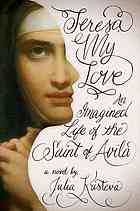
Teresa, My Love
An Imagined Life of the Saint of Avila
کتاب های مرتبط
- اطلاعات
- نقد و بررسی
- دیدگاه کاربران
نقد و بررسی

September 8, 2014
Kristeva, a preeminent French linguist and psychoanalyst, continues her advance into literature with an impenetrable book about psychoanalyst Sylvia Leclercq’s intellectual dissection of Teresa of Ávila, a Catholic saint who flourished during the 16th-century Counter-Reformation. Masquerading as a novel, the text is really an expansive psychoanalytical sketch of Teresa, with brief, opaque forays into Sylvia’s life as a bored academic juggling a bevy of indistinguishable male lovers. Familiarity with both Teresa’s life and with the basics of Freudian-Lacanian theory are required to wade through the dense text, and Kristeva wastes no time on background information before plunging into an esoteric, stream-of-consciousness analysis of the saint’s writings. Halfway through the novel, readers are treated to a few chapters of straightforward history, a breath of fresh air after hundreds of pages of laborious prose (“a suffering-jubilant body turns into characters and visions, a cascade of third persons brought about
by the grace of the Other, the better to know oneself in losing oneself”). There are frequent interruptions—a theatrical reimagining of Teresa’s deathbed, song lyrics, authorial commentary by both Kristeva and Sylvia—that add little to the plot or to a deeper understanding of Teresa. Kristeva’s literary experiment is ambitious but the result is disappointing.

November 1, 2014
In this new work from Kristeva, the noted French philosopher, psychoanalyst, and critic who began writing fiction two decades ago, psychoanalyst Sylvia Leclercq is an atheist nevertheless intrigued by St. Teresa of Avila. Leclercq embarks on an exploration in which she tries to use her academic and professional skills to understand a woman of great contradictions. Teresa was both a mystic who experienced ecstasies in which she felt that she was one with God and a pragmatist who reformed the Carmelite Order. At times a flirt, she was also known for her self-mortifications. She was a writer, too, who enjoyed success and respect even as she was targeted by the Spanish Inquisition and censured as an outspoken woman. Most affecting when it is most straightforward and most ambitious when it experiments with form by pulling in everything from music to philosophy, this book is finally so long and often so academic that only the most patient readers will persevere. Ultimately, what is most provocative here is how all the narrator's intellectual efforts to understand Teresa are not enough; she succumbs to a love that is as inexplicable as Teresa's devotion to God. VERDICT Recommended only for those who appreciate dense, challenging works such as John Barth's Giles Goat-Boy.--Evelyn Beck, Piedmont Technical Coll., Greenwood, SC
Copyright 2014 Library Journal, LLC Used with permission.

























دیدگاه کاربران